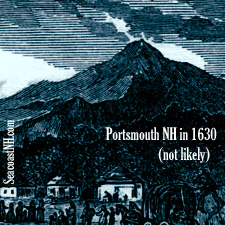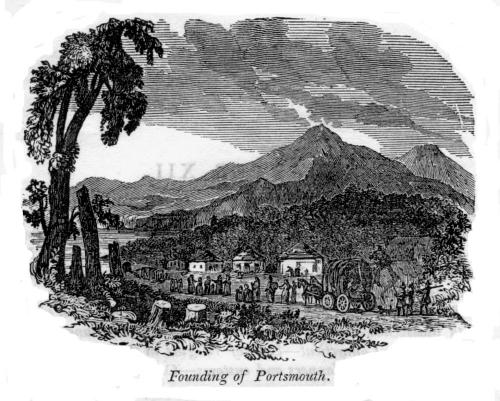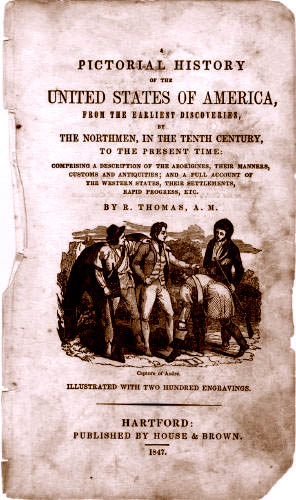|
FRESH STUFF DAILY |
|
|
||
|
|
||
|
|
||
|
SEE ALL SIGNED BOOKS by J. Dennis Robinson click here |
||
History books can lie. We were fascinated by the illustration of Portsmouth, New Hampshire offered in this 1847 pictorial history of the USA. The content is accurate and well written -- but that picture! . We offer the entire early history here. Readers may be curious to read how the founding of the Seacoast region was described over 150 years ago.
From an 1847 history of the United States Settlement of New England -- New Hampshire explored by Captain Smith --Settlements made by Gorges and Mason -- Portsmouth founded -- Union of the colony with Massachusetts. The colony of New Hampshire, which now holds a distinguished rank among the New England states, though its settlement began at a very early period, did not become a separate colony till many years after that settlement commenced. Captain Smith, of Virginia, who sailed along the shore of New England, in 1614, and published a chart of the coast, with some account of the country, discovered the river Piscataqua. He found the river to be large, the harbor capacious and safe, and gave a favorable representation of the place as it for a new plantation. Gorges and Mason, two members of the council of Plymouth, in England, having obtained from the council a grant of that tract of country, attempted the establishment of a colony and fishery at the river Piscataqua. In the spring of the year 1623, they sent over a few persons for this purpose, who sat down on the south side of the river, near its and there fixed a temporary residence. This was the beginning of the ancient and flourishing town of Portsmouth. The same year, two of the company erected a fish-house at the place of the present town of Dover. These settlements, for several years, were small, and scarcely permanent. In 1629, some of the settlers about the Massachusetts Bay wishing to unite with the settlement at Piscataqua, they assembled the chiefs of several Indian tribes at Squamscot Falls, now Exeter, and, for a valuable consideration, made a purchase of an extensive tract of land. In the instrument of conveyance, the natives express a "desire to have the English come and settle among them, as among their countrymen in Massachusetts." After this purchase, the plantation had a moderate increase, but no new settlements were made till the year 1638, which was the beginning of the towns of Exeter and Hampton. The people at Dover early erected a convenient meeting house, which was afterwards used as a fortification. A church was soon organized, of a character similar to the churches in the neighboring colonies: and Mr. William Leverich, a worthy and able Puritan divine, came from England, in 1633, and became their minister. The settlement at Portsmouth, in their infant state, erected a house for divine worship, and enjoyed, successively, the labors of several faithful ministers. The ministry of one of these, Mr. James Parker, was attended with much success. But the town had no regular minister till a number of years after its settlement.
The settlements at Portsmouth and Dover, for several years, were governed, principally, by agents sent over by the proprietors in England. Having experienced many inconveniences from this mode of government, they separately, forming a civil compact, after the example of their neighbors at Exeter, enacted and enforced their own laws. The combination at Dover was similar to the one at Exeter; at Portsmouth they had a chief magistrate, annually elected, styled a governor. These settlements for many years, lived peaceably with the natives, and, from their great advances for fishery, experienced less of the evils of famine than the neighboring colonies. Placed in distinct civil communities, they soon found themselves exposed to a variety of difficulties and peculiarly defenseless in the event of trouble from an enemy. Their corporations were necessarily weak, and exposed to the intrusion of vagrants and outlaws, who would not submit to the steady government which was maintained in the colonies of Massachusetts and Plymouth. Had these political combinations been left to the management of their original framers, and their posterity, they might have exhibited an example of the finest republics on historic record. But the constant influx of emigrants and of demagogues, invited by their weakness, rendered this expectation hopeless. These considerations induced the settlement to desire a union with the colony of Massachusetts. The subject having been for some time in agitation, in the year 1641, the settlements on and near the Piscataqua submitted to the jurisdiction of Massachusetts, on condition of enjoying equal privileges with the people of that colony, and having a court of justice maintained among themselves. They were cordially accepted by that government, and thus, by a solemn compact, became a part of the colony of Massachusetts. From this time, the settlements advanced in a more rapid progress, and in greater security; and their civil and ecclesiastical history becomes one with the colony of which they now constituted a respectable portion. This union continued till the year 1679, when by the authority of the king of Great Britain, New Hampshire was separated from the government of Massachusetts, and became a royal province. Excerpted from:
Please visit these SeacoastNH.com ad partners.
News about Portsmouth from Fosters.com |
| Wednesday, April 24, 2024 |


|
Copyright ® 1996-2020 SeacoastNH.com. All rights reserved. Privacy Statement
Site maintained by ad-cetera graphics

 Smuttynose Murders
Smuttynose Murders





















